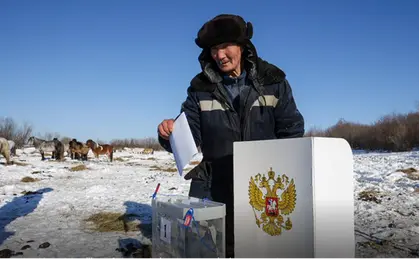Election authorities said that voting had begun on Sunday in remote areas of the country and parts of occupied Ukraine, the pro-Kremlin newspaper Izvestia reported.
Candidates for the presidency launched their campaigns on TV last week, and there is regular media coverage of them conducting election campaigns throughout the regions.
JOIN US ON TELEGRAM
Follow our coverage of the war on the @Kyivpost_official.
For an election that many consider to be a charade, one whose outcome has already been decided in favor of the incumbent, President Vladimir Putin, Russia goes to extraordinary lengths to ensure everyone gets to vote.
While regular voting to select the “new” president officially takes place between March 15 and 17, procedures are put in place for those who live in remote areas or who otherwise can’t easily get to a polling station. According to Izvestia, residents in 37 regions, including the occupied Ukrainian territories, are eligible to vote early.
Early voting has begun in 15 Russian regions where residents of hard-to-reach and remote areas were the first to cast their votes, beginning on Sunday, Feb. 25. Elections also began for residents of settlements in the occupied areas of the Donetsk, Luhansk, Kherson and Zaporizhzhia. Russia controls roughly one-fifth of Ukraine’s territory if the Crimean Peninsula, which Moscow annexed in 2014, is taken into account.
“Hard-to-reach” encompasses such diverse individuals and communities involved in hunting, fishing, logging, mining, manning lighthouses and nature reserves.

Putin and Xi Praise Ties, Hours After Trump Sworn In
According to a spokesperson for Russia’s Central Election Commission (CEC) its members will visit weather and polar stations, reindeer herding camps and distant settlements using helicopters, snowmobiles and even dog sleds to get there.
For all regions that have early start dates, polls will close on or before March 14. The CEC claim that once early voting is completed, the ballot boxes are sealed and delivered to the election commissions, where the votes will be counted. Such ballots will not be opened until after the main polls close on March 17.
Critics have said that these extended voting periods make it easier to commit voter fraud, as it becomes harder for monitors and poll workers to notice irregularities. This is especially true in 2024, where Russia has declined to invite observers from the OSCE’s Office for Democratic Institutions and Human Rights (ODIHR) which as a current member nation includes a commitment to allow ODIHR observation.
The leaders of the OSCE’s Parliamentary Assembly (OSCE PA) and its ODIHR called Moscow’s decision “deeply regrettable.” ODIHR Director Matteo Mecacci said: “We are greatly disappointed at the decision not to invite the OSCE to observe the Russian presidential election. This runs contrary to the OSCE commitments made by the Russian Federation, and at the same time will deny the country’s voters and institutions an impartial and independent assessment of the election.”
The US mission to the OSCE went further, publishing its view on the decision: “This unfortunate decision by the Kremlin cannot be viewed in isolation. It comes in the context of intensifying repression within Russia against those who peacefully dissent, including members of the political opposition, and a relentless crackdown on civil society and independent media. The decision also comes at a time when the Kremlin is prosecuting a brutal war against its neighbor, Ukraine, and harshly punishes those in Russia who criticize the war.”
The state news agency TASS counters this by saying Moscow has invited over 500 independent observers from Asia, Africa, Latin America and elsewhere in Europe. In 2014, when Russia held a referendum in occupied Crimea, many of the European observers hailed from far-right parties known to receive funding from Moscow, such as Italy’s Northern League and France’s National Front.
The independent Russian news site Meduza quoted Kremlin sources in July saying that it was decided that Putin should be seen to win with at least 80 percent of the vote and said the Russian administration would field a variety of methods to hit the target, including “mobilization of the president’s real supporters, administrative and corporate mobilization, and electronic voting.”
You can also highlight the text and press Ctrl + Enter










